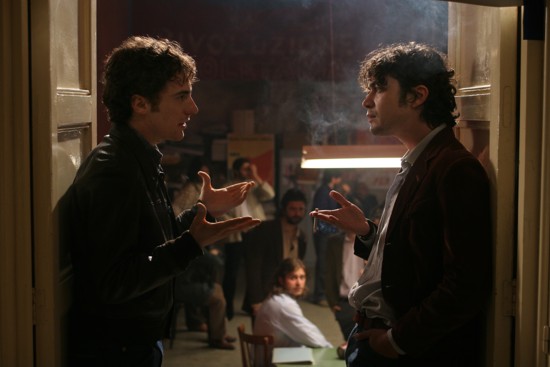|
Reviews of Recent Independent, Foreign, & Documentary Films in Theaters and DVD/Home Video
Directed by Daniele Luchetti Produced by Riccardo Tozzi, Giovanni Stabilini & Marco Chimenz Written by Sandro Petraglia, Stefano Rulli & Luchetti, based on he novel Il Fasciocomunista by Antonio Pennacchi Language: Italian with English subtitles Italy. 108 min. Not Rated With Elio Germano, Riccardo Scamarcio & Diane Fleri The same screenwriters of the sweeping, heartfelt epic The Best of Youth give us another set of Italian brothers on divergent paths in the 1960s. Political agendas drench the film in a blatant and uncommercial manner unthinkable for an American film with similar A-list stars. (Likewise, the Italian teenage comedy Caterina in the Big City from 2003 divided high school cliques between the leftist and the far-right mean girls). Teenager Accio, as the sole fascist in his family of communists, grows up an outcast. He joins his sleepy small town’s gang of far-right hooligans because he wants to “redeem his country,” but from what is not entirely clear. Perhaps it’s because he’s spoon-fed doctrine by an older, burly father figure. (Not for nothing, the film’s setting, the town of Latina, was founded by Mussolini.) The novel, which this film is based on, has a more succinct title that easily crosses borders – Il Fasciocommunista, which pretty much sums up Accio’s journey. Meanwhile, older, wild-haired Manrico (blue-eyed heartthrob Riccardo Scamarcio) participates in actions that foreshadow the violence that would linger into the ’70s. If you try keeping track of the number of slaps within Accio’s household, you’ll loose count. He receives one from his father for denying the Holocaust (Accio may be played by a freckle-faced Elio Germano, but that’s the most innocuous quality about him), and another from his mother for supporting the wrong strike. His older sister, though, finds that it does help to have a fascist in the family – to beat up ex-boyfriends. But all points of view are comically knocked. Students, after taking over a music conservatory, refashion Beethoven’s “Ode to Joy” from a fascist anthem to a slogan-ridden, heavy-handed paean to the proletariat.
If the political backdrop is not alienating, Accio’s actions might be. As he swings from one side of the pendulum to the other, he remains at arm’s length as the
episodic film glibly moves from incident to incident, more a catalogue of youthful foibles and follies. His maturation ultimately comes down to
fashion: changing from button-down shirt and tie to the leftist uniform of turtleneck and leather jacket.
Kent Turner
|

